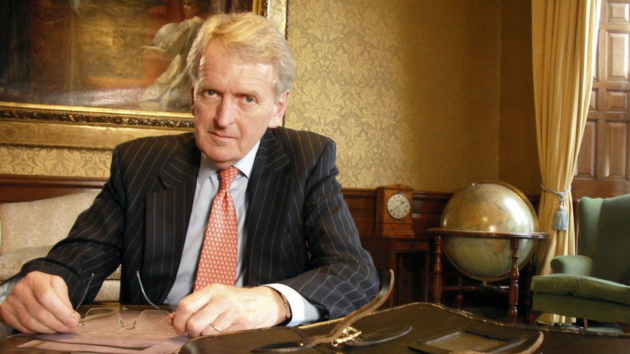The wit and wisdom of Sir Christopher Meyer (1944-2022)
The late Sir Christopher Meyer was probably best known to the public as one of this country’s most senior diplomats, serving as British Ambassador to the United States from 1997 until 2003. However in Whitehall, at Westminster and on Fleet Street he had already established himself before that appointment as a prominent government communicator, first as the head of the Foreign Office News Department in the mid-1980s and then as Downing Street Press Secretary between 1994 and 1996.

It was in this context that I interviewed him in 2018 as part of my research for 100 Years of Government Communication. As this was a book published by the government, I luckily faced no barriers in arranging interviews with a number of distinguished public servants, including three former Cabinet Secretaries who provided a surfeit of piercing insights. I don’t think I would be insulting anyone though by saying that for sheer entertainment value and vitality of recollection, Sir Christopher’s contribution – or perhaps I should say performance – was unequalled. Within moments of us sitting down, he transported me back to the dying days of the Major government as he recalled:
We almost always had our back to the wall, it was a kind of Rorke’s Drift situation with the hacks around you…deploying every theatrical device to divert their attention and send them off in the wrong direction, keeping them from asking the one thing you didn’t want them to ask. You’d make gurning expressions and behave like John McEnroe, picking deliberately on one journalist and exclaiming ‘What? You can’t be serious?’ You had to come up with anything. Anything!
As the Press Office attempted to hold the fort after PMQs, the Prime Minister could often be found in his room, “head in his hands. You’d say, ‘What do you want me to say about your answer to x?’ and he’d reply ‘Did I say that? Oh dear, you’ll think of something.’”
This was acted out in full by Sir Christopher, including despairing gestures and a passable impression of John Major. Facing what he called the “hot breath of the Lobby” might have been uncomfortable at the time but Meyer admitted with a chuckle that the journalists’ “sense of the jugular was stupendous.” On occasion, their company seems to have been preferable to that of his political masters, particularly as Major became weaker and the government became leakier. As he put it:
The Downing Street Press Secretary’s authority over the other press secretaries in Whitehall is precisely linked to the authority the Prime Minister has over his or her cabinet…I could point the finger at people who I thought were leaking, but I couldn’t ring up Ken Clarke or Michael Portillo and say ‘oh that’s from you, isn’t it?’
Sir Christopher was perhaps a softer personality as Press Secretary compared to some of his successors and particularly one of his predecessors, Bernard Ingham. Nevertheless, he regarded the latter as “the greatest press secretary in the universe and [his] mentor…” They would travel to international summits together when he was the Foreign Office spokesman and he described how he watched in awe as the older man handled tabloid reporters with brutal skill.
When Meyer originally swapped the Moscow Embassy for the Foreign Office News Department in 1984, he said he experienced a “moment of hubris and delight” when he realised he could exercise enormous power from the centre in advising not just how to sell a policy, but also whether it was saleable in the first place. However, these were still early days for communicators being regarded as integral and equal elements in the civil service machine. Following his pivot into the media sphere, certain diplomats regarded him for some time – he said in a tone of mock hysteria and disgust – as “a traitor, or as if [I] had some kind of hideous disease!”
He believed his policy background served him well as a communicator but was keen to emphasise that in his opinion, “there is no average press officer. Temperament, character…thespian qualities are almost as important as the ability to learn stuff and regurgitate it to journalists.” The best practitioners “know how to win the confidence of journalists…they have the gift of the gab”. Paradoxically though, the successful spokesman has to be both a character and simultaneously an invisible presence: “Press secretaries who like to become the story are on the road to perdition.”
The strikingly titled ‘Hacks and Pin-Striped Appeasers: Selling British Foreign Policy to the Press’ was a paper Sir Christopher wrote whilst on sabbatical as a visiting fellow at Harvard. It contained much pithy good sense and robustly challenged certain ‘anti-spin’ orthodoxies; proudly declaring that “the maligned 15-second soundbite on TV news can be a vehicle without equal for illuminating an issue vividly and compactly.” The paper also set out “Ten Commandments for dealing with reporters” that included being accessible, helpful and friendly; avoiding waffle, lies, favouritism and disputes over minor differences of interpretation; taking journalists seriously; making sure that the terms on which a briefing occurs are clear and ensuring ultimately that what is said is newsworthy.
And yet, for all his expertise and insight Sir Christopher never claimed to be an infallible oracle in these matters. As he cheerfully admitted about his time briefing the press in Number 10: “I would sometimes wake up in the night and something would rise to the surface and I’d think ‘S**t, I shouldn’t have said that!’”
- Image credit:
- BBC (1)
